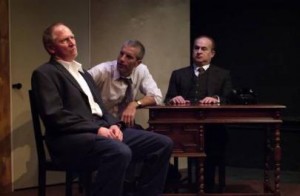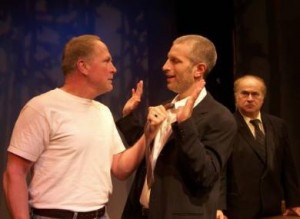RECOMMENDED
Remember the days when Hollywood regularly turned out major films with
politically or socially relevant themes, movies like The China Syndrome? The
fact that T.S. Cook’s Ravensridge was (in the playwright’s own words)
“summarily rejected by networks and studios alike” is proof that those days are
no more, and is particularly ironic because Cook was one of the Oscar
nominated writers of that award-winning 1979 film.
Fortunately, South Pasadena’s Fremont Centre Theatre was willing to take a
chance on writing that is relevant, thought provoking, unabashedly political,
and fortunately for playgoers, entertaining to boot. In a class A production,
director James Reynolds has assembled a crackerjack cast and design team
who together make Cook’s intelligent (and funny) play come alive.
Ravensridge may sound a bit like the title of a Gothic romance novel, but in
fact it is the name of a fictional West Virginia steel mill town. Unionized workers
have been on strike there for well over a year (the play is set in 1992 and
inspired by real events), and have seen their jobs taken over by scabs.
50something union officer Will Torrey has discovered that the mill is owned by
an American multimillionaire wanted for stock fraud and currently living the
high life in post-USSR Russia—under the protection of the richest man in the
former Soviet Union. Accompanied by other steel workers, including the young
and attractive Lilly Matthews, Will has traveled to Russia to reason with the
fugitive mill owner in the hopes of resolving the strike. When Will attempts to
approach the Russian who is protecting Miller, a bodyguard pokes him with an
electric cattle prod, Will pushes him away, and the guard falls down stairs to his
death.
Now, in a prison where under Soviet rule “thousands of people have spent
thousands of hours for thousands of crimes,” Will must prove that it was self-
defense, not murder.
He is interrogated by Major Viktor Davidykov, approximately Will’s age and a
communist, a man who must certainly, Will believes, be the last person who
could possibly be on the side of an American.
In prison interrogation scenes, Cook’s dialog crackles with humor. A few
minutes into his questioning, a frustrated Will asks, “Don’t I get to talk to
someone?” to which Viktor replies, “Haven’t I just talked to you?”
One of the most intriguing aspects of Cook’s play is the way in which Will and
Viktor come to see each other as more than propaganda stereotypes. Viktor is
astounded to learn that there are actually labor strikes in America. At the
same time, he defies Will’s expectations of a Russian communist. In one of the
most striking bits of dialog, Cook has Viktor blaming the U.S. for the Cold war
and accompanying arms race. “The system didn’t cave in. It got crushed. It
was a game for you. It was life and death for us.” Now, two years after the fall
of the Soviet Union, Viktor misses the hard times. True, things were bad in the
USSR, “but we were in it together. We believed in something greater than
ourselves.” He is dismayed that in contemporary Russia, eight men own
“everything worth owning.” He also has his own personal tragedy which
weighs on his soul.
Absolutely convincing as Viktor, Robert Trebor captures the Major’s sternness,
his humanity, and his sense of humor as well. Though he speaks with a strong
Russian accent, his speech is peppered with American slang, much of which
he seems to have picked up from the phrase book he has always at hand, and
which he consults whenever Will comes up with an expression he’s not yet
heard, like “spider to a fly.” When Will finally uses the word “freedom,” Viktor is
overjoyed. (He and his cronies had placed bets on how soon he would utter
“the F word.”) When Lilly is allowed into the interrogation room to speak to Will,
Viktor tells them, “I will leave you two alone…except for the TV cameras of
course.”
Giving an intense and impassioned performance as Will is Vaughn Armstrong,
the splitting image of a West Virginian miner with an All American belief that
right will prevail, if he can only find a way to talk face to face with Miller.
Meanwhile Lilly (Emily Adams, looking and sounding exactly like the small town
West Virginia girl she’s portraying) is being accompanied by Mikhail (a
sympathetic Jed Reynolds), the handsome Russian junior officer assigned to
Will’s case. Lilly defends Will. He’s innocent, she insists, though he could get
himself in trouble with his mouth. Not to worry, declares Mikhail. “The Major is a
good man…if sad.”
Ravensridge takes a dramatic turn when Viktor grants Will’s request to speak
with Richard Miller. Arriving in the interrogation room, the wealthy American
looks nothing like the personification of evil we’ve been expecting. Richard (a
suave and handsome Jon Sklaroff) seems hardly a monster. In fact, he seems
like a pretty nice guy, with sex appeal to boot. Miller’s been to West Virginia,
he says. He’s been to Ravensridge. It’s a beautiful place. Both he and Will
want to go home. Maybe they can reach an agreement.
No more will be revealed here. Suffice it to say that sparks fly between the two
Americans, and once again much of the fire is about ideas, with some of
Richard’s assertions about the world mirroring Viktor’s descriptions of today’s
Russia.
If there is any flaw in Cook’s fine script, it is that the relationship between Lilly
and Mikhail could benefit from a bit more development. Since we don’t know
what the Russian’s motives are, we don’t know how to regard their romance,
if indeed it is one. Is Mikhail sincerely falling for the attractive American, or
using her? Perhaps this omission is deliberate, but I would like to have known a
bit more about Mikhail’s reasons for pursuing Lilly.
Victoria Profitt has designed a particularly good looking set which, thanks also
to Carol Doehring’s lighting, allows for rapid scene changes, from an
interrogation room to a prison cell to a park somewhere in Russia. There is
excellent work also from Lois Tedrow (costumes) and Dick Spaulding (sound
design). Finally, and deserving special mention, is Kim Story as the Troubadour,
who strums and sings Appalachian folk songs between scenes, just the right
mood setter.
Hopefully, someday soon Hollywood will come calling for Ravensridge. Until
then, there is this fine stage production of T.S. Cook’s provocative script which
is well worth seeing.
Fremont Centre Theatre, 1000 Fremont Avenue, South Pasadena.
–Steven Stanley
February 29, 2008
Photos: Mieke Kramer




 Since 2007, Steven Stanley's StageSceneLA.com has spotlighted the best in Southern California theater via reviews, interviews, and its annual StageSceneLA Scenies.
Since 2007, Steven Stanley's StageSceneLA.com has spotlighted the best in Southern California theater via reviews, interviews, and its annual StageSceneLA Scenies.







 COPYRIGHT 2024 STEVEN STANLEY :: DESIGN BY
COPYRIGHT 2024 STEVEN STANLEY :: DESIGN BY